Acne sucks. It’s bumpy, annoying, and often quite painful. There are a myriad of different acne subtypes with an array of etiologies, and it is nearly impossible to avoid at least one of them. As a result, there have been many avenues explored to find a cure, from scientific studies to holistic practises. With regards to the latter, a particularly intriguing practise has remained a staple in the diagnosis and treatment of acne.
Face mapping, or mian shiang (‘face reading’ in Chinese), is an ancient practise rooted in Traditional Chinese medicine. The idea behind it is that certain parts of the face correspond with different organs of the body. According to the beliefs, an imbalance or weakness in any particular organ in the body, from a struggling liver to a flaky gut, manifests itself as redness, pimples or dryness on the face.
Now, there’s no scientific basis behind this practice so we recommend you take this with a grain of salt. However, in case you’re interested anyway, this is what each area of your face represents according to Traditional Chinese medicine:
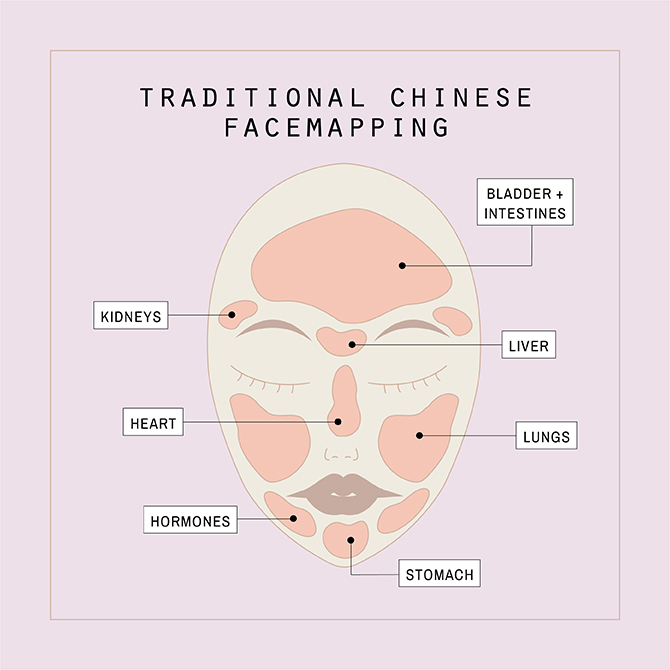
Don’t despair yet, though—while there’s little evidence to back Traditional Chinese face mapping, there’s plenty of ways that face mapping can still come in handy with the right tweaks. We’ve devised a new-ish map that considers environmental and lifestyle factors that are scientifically-based. Without further ado, here’s why you’re getting acne on:
Your poor hairline and forehead

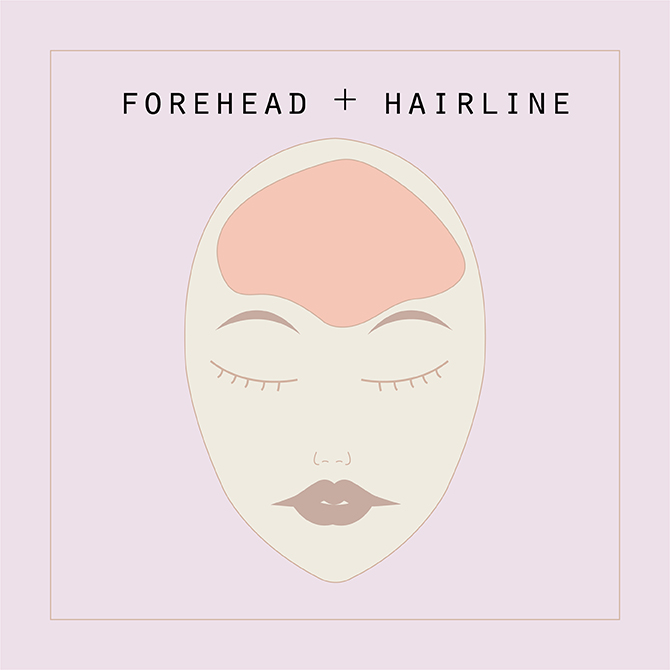
Are you a big fan of greasy hair products? Do you have bangs? Are you an alternate-day shampooer? These are all things that may be contributing to your forehead acne.
The best course of action here is to avoid comedogenic, pore-clogging products where you can, and maybe keep your bangs off your face when they get greasy. Further, you could probably invest in a good clarifying cleanser to keep that comedogenic residue off your face.
If you find your acne extends down your nose, you may also just have an oil issue. Your T-zone is sebum-central, and it’s a really common area for breakouts to occur. Oil-aside, your sleeping patterns and stress levels may also be making your T-zone acne worse, according to these studies.
The key to resolving your acne here is to ensure you’re getting your full night of sleep, keeping your stress to a minimum and investing in a good acne-busting face wash.
Your cheeky cheeks

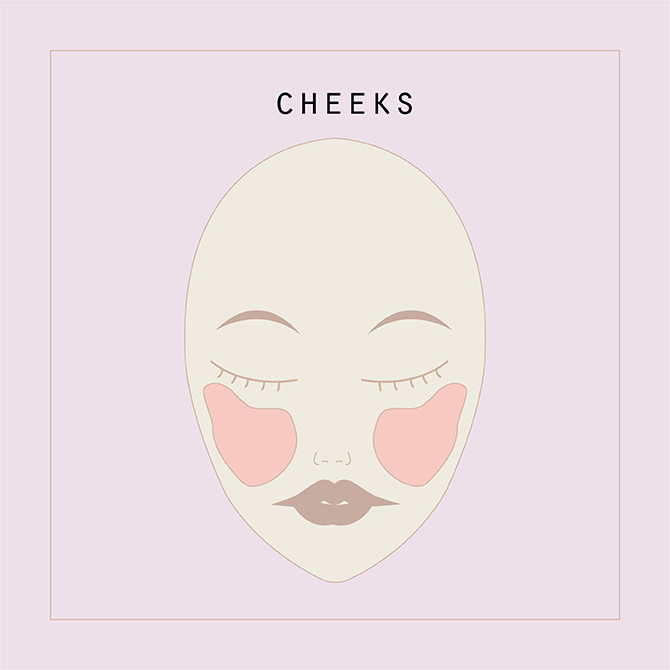
This is going to sound gross, but your phone is a toilet. In fact, it’s worse than a toilet—that thing follows you around all day. It picks up bacteria from restaurant tables, the buses you frequent, and the park benches you sit on and then you put it on your face and chatter away.
Unfortunately, every time you hold your phone up to your face, you spread all of that nasty bacteria around and build a breeding ground for your next festering breakout.
Not to mention, your grubby pillowcase isn’t doing you any favours either. Over time, all of the grease from your head absorbs into your pillowcase. Then, while you toss and turn trying to get to sleep, you squish your face into it and spread that pore-clogging stuff all around.
The answer to this cheeky predicament is simple—disinfect your phone regularly, wash your pillowcase weekly and stop touching your face (seriously, it’s day ??? since the pandemic, you should know this by now).
Your chiseled jaw

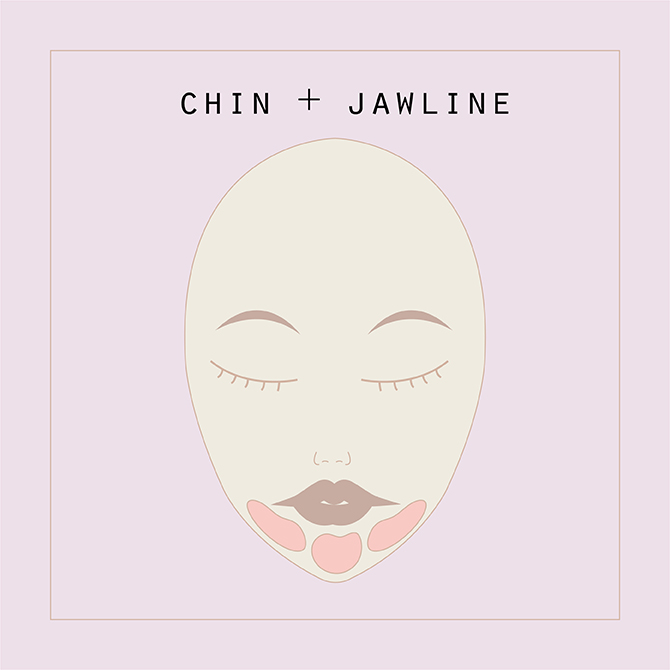
This is actually where Chinese face mapping gets it right—chin and jaw acne tends to be caused by hormonal changes. This means that the acne is, in fact, caused by a disruption in your endocrine system. Progesterone, in particular, is a hormone that is associated with the flare-up of skin conditions like acne, psoriasis, and rosacea.
If you suffer from acne that is concentrated around your chin and jaw, you may want to look up a dermatologist. From there, they will be able to help you devise a strategy to combat your hormonal acne which, by the way, is the most stubborn kind of acne out there. These may include a isotretinoin prescription, retinoids or birth control pills.
Why birth control? Well, oestrogen apparently has beneficial effects on the skin, specifically with regards to acne. This study states that the hormone is known to suppress sebum production in sufficient amounts; however, it comes with its drawbacks (too much oestrogen in a lifetime is linked to breast cancer).
Maybe it’s face mapping, maybe it’s your horrible diet

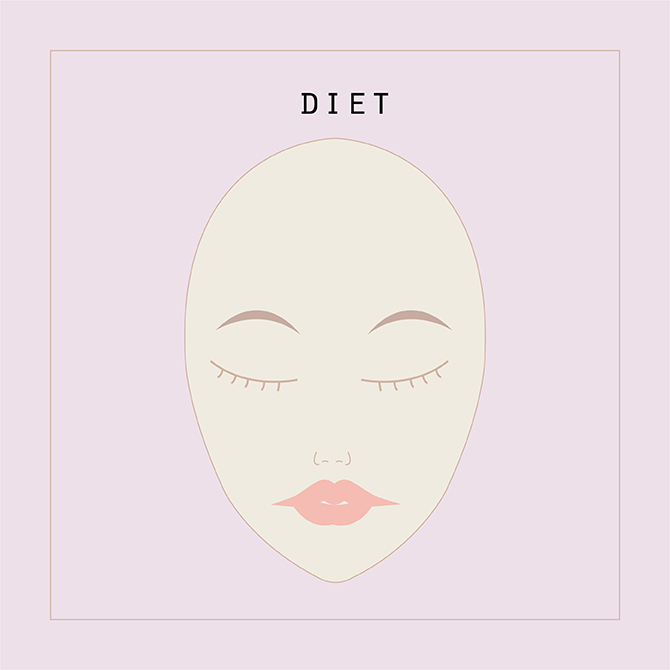
While spots on your forehead doesn’t necessarily mean you have irritable bowel syndrome, your digestion is heavily linked to your acne. In fact, your diet can have such an adverse affect on many acne-causing factors including insulin resistance, microbiome modulation and sex hormone balance.
As a result, it is probably the single most important thing for you to control. This study found that probiotics and a hefty helping of fruits and vegetables were shown to improve acne conditions. In addition, purging dairy and sugar from your diet may help your skin issues too.
On the note of a good, balanced diet, keeping your hydration levels up is also a good shout. According to this study, acne-prone skin has a poor water retention rate, so you need to keep on top of your daily water intake if you want better skin.
Overall, there are a lot of reasons you may be suffering from acne. However, rather than consult ancient Chinese practices, you may want to either make some lifestyle changes or visit a dermatologist.
For more acne-related tips, click here.
| SHARE THE STORY | |
| Explore More |




